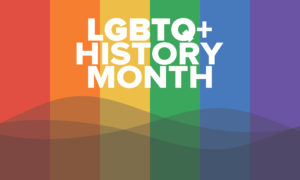February is when the UK and USA recognise LGBT+ History Month; an annual, month-long observance of lesbian, gay, bisexual and transgender history.
It is important that the progress the community has made is not just recognised but celebrated within the workplace and a discussion opened on what else can be done to improve LGBT+ representation and acceptance within businesses and the wider community.
In this blog, to help businesses and HR teams understand the importance of this month, we share some key information about the movement and how it can be recognised and celebrated in the workplace.
The history of LGBT+ History Month

Surprisingly, in the workplace, it was only in the early 2000s that employment laws regarding sexual orientation and gender identity began to evolve into the laws that we have today.
First taking place in February 2003, LGBT+ History Month came following the abolition of Section 28 of the Local Government Act 1988 which previously made it unlawful for local authorities to do the following:
- intentionally promote homosexuality or publish material with the intention of promoting homosexuality
- promote the teaching in any maintained school of the acceptability of homosexuality as a pretended family relationship
LGBT+ History Month is also recognised and celebrated in the USA and other LGBT+ progressive countries.
The intentions and aims of the month are to raise awareness of the brave activists that fought for LGBT+ rights over the years and also understand what changes can be made in the present day to improve diversity and inclusivity for the LGBT+ community.
Most employers and organisations understand the need to comply with equality laws and workplace diversity as a positive aim and strategy, with the organisational benefits understood.
However, that does not mean that more can’t be done.
For an organisation to have a positive position on LGBT+ History Month, it depends on several factors, including organisational culture, management practices, interpersonal relationships, awareness, respect and support.
Worryingly, discrimination, whether because of sexual orientation or otherwise, and in all its guises, still exists in organisations. This is why LGBT+ History Month is now more important than ever.
Why is it important in the workplace?
LGBT+ History Month should be a time for organisations to further recognise, celebrate and promote diversity and openness within the workplace.
It provides the ideal opportunity to champion role models, encourages an inclusive workforce, work towards combatting any remaining prejudice and generally represent a civil rights statement about the contribution of the LGBT+ community.
The power and positive impact of a workplace that is truly inclusive should not be underestimated or ignored. The business benefit of being an inclusive workplace, where everyone is accepted for who they are, can benefit an organisation both culturally and financially.
Organisations need to create somewhere to work where everyone can thrive, as it’s all too easy for employees to become isolated when they feel they can’t be themselves in the workplace.
What can businesses do to recognise this month?
There is an abundance of resources available to help organisations celebrate, educate, and inspire inclusivity in the workplace this LGBT+ History Month and beyond. Below are a few ideas and activities:
- Invite an LGBT+ speaker to the organisation to deliver a talk – a powerful way to inspire meaningful action in your employees is with an LGBT+ speaker. An insightful and inspiring figure from the community can educate an audience with their personal stories of perseverance in the face of discrimination. Attendees can come away with a new perspective on the LGBT+ fight for equality.
- Host and deliver an inclusion training workshop – delivering an inclusion training workshop will provide the organisation with the chance to host a hands-on, interactive session that will encourage employees to question their bias and make a change. There are specialist companies that can help to deliver this.
- Deliver a history lesson – the purpose of LGBT+ History Month is to educate and inform, with so many people unaware of history, events and figures from this community, use this month to teach your employees the importance of LGBT+ history. Put on a lunch and learn for the organisation, a relaxed approach to education will be both informative and enjoyable.
- Support a queer-owned business – a brilliant way to celebrate LGBT+ History Month is to support business owners in the community that will have likely faced prejudice on their business journey. For example invite an LGBT+ catering company to provide food for the organisation.
- Pledge to an Inclusion Policy – to have a meaningful impact this LGBT+ History Month pledge and launch support of an inclusion policy within the organisation. It is easy to post an LGBTQ+ flag on LinkedIn, but real action is improving your discrimination policies. Set out written plans outlining how your organisation will improve diversity and inclusion within your company – not just for the LGBT+ community, but for everyone.
For additional support and information on how your organisation can recognise and celebrate LGBT+ History Month in February, seek an independent HR adviser for guidance and support.


